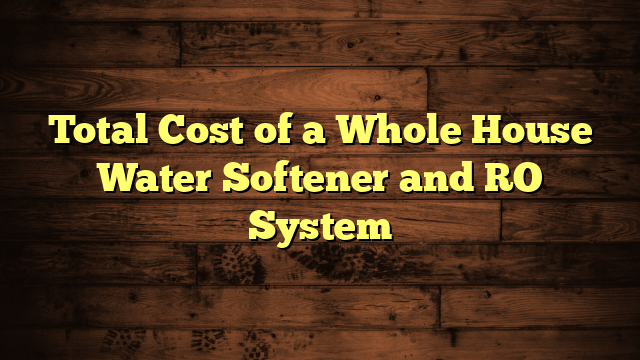Total Cost of a Whole House Water Softener and RO System
You might be surprised to learn that investing in a whole house water softener and reverse osmosis (RO) system can be more than just a one-time expense. Not only do you have the initial costs of purchasing and installing the systems, but you'll also need to take into account ongoing maintenance and potential repair costs. As you weigh these factors, it's important to understand how these systems can impact your long-term savings and overall quality of life. So, what should you keep in mind when evaluating your options?
Key Takeaways
- The total cost for a whole house water softener ranges from $1,000 to $5,000, including the system and installation.
- Reverse osmosis (RO) systems can cost between $200 and $2,000, depending on complexity and installation requirements.
- Professional installation can add $50 to $300 for permits and $100 to $500 for additional materials.
- Ongoing maintenance costs include regular salt refills for water softeners and filter replacements for RO systems, affecting overall expenses.
- Long-term savings from reduced appliance repairs and lower energy bills can offset the initial investment in these systems.
Understanding Water Softener Costs
When it comes to understanding water softener costs, you'll find that several factors influence the final price. First, the water quality in your area plays a significant role. If you've got hard water with high mineral content, you might need a more advanced system, which can drive up costs.
Take time to test your water; knowing its makeup can help you choose the right softener for your needs.
Next, consider the system lifespan. A higher initial investment in a durable, high-quality water softener could save you money in the long run. These systems often require fewer repairs and have longer warranties, meaning you won't have to replace them as frequently.
Installation costs also vary; some systems are DIY-friendly, while others need a professional touch, which can add to your overall expenses.
Don't forget about ongoing maintenance costs, either. Regular salt refills and occasional servicing are essential to keep your system running smoothly.
Weighing these factors will give you a clearer picture of water softener costs, helping you make an informed decision that fits your budget and enhances your home's water quality.
Understanding RO System Costs
Understanding the costs associated with a reverse osmosis (RO) system involves several key factors that can affect your overall investment.
First, you need to evaluate the RO filtration types available, as these can range from basic under-sink models to more advanced whole-house systems. Each type comes with its own price tag, which can greatly influence your budget.
Next, think about the reverse osmosis benefits you'll gain from your system. These include improved water taste, reduced contaminants, and healthier drinking water for your family. While the initial cost might seem high, the long-term savings on bottled water and health benefits can make it worthwhile.
Don't forget about maintenance costs, which will vary depending on the type of system you choose. Some systems require regular filter replacements, while others may have lower upkeep needs.
Lastly, evaluate any additional features, such as storage tanks or UV filters, which can also add to the overall cost.
Installation Expenses
Before diving into the installation of your whole house water softener or RO system, it's crucial to take into account the associated expenses.
The installation timeline can vary greatly based on factors like existing plumbing and the complexity of the system you choose. You might encounter installation challenges that can affect both time and cost.
Here are some expenses you should consider:
- Labor Costs: Hiring a professional plumber can range from $50 to $150 per hour, depending on your location and expertise required.
- Permitting Fees: Some municipalities require permits for installation, which can add anywhere from $50 to $300 to your total costs.
- Additional Materials: Piping, connectors, and other materials may be needed, costing you anywhere from $100 to $500.
- System Specifics: The type of system you choose can heavily influence the installation cost, with more advanced models requiring more intricate setups.
Maintenance and Operating Costs
Once your whole house water softener or RO system is installed, you'll want to keep an eye on ongoing maintenance and operating costs. Regular maintenance is key to guaranteeing both systems operate efficiently.
For a water softener, this typically involves adding salt, which you should do every few months, depending on your water usage. For reverse osmosis systems, you'll need to change filters regularly—usually every six to twelve months—to maintain ideal water quality.
The maintenance frequency directly impacts the operating efficiency of your systems. When you stay on top of these tasks, you not only guarantee a longer lifespan for your equipment but also enhance its performance.
Neglecting maintenance can lead to decreased efficiency, requiring more energy and resources to function properly, which can inflate your utility bills.
In addition to scheduled maintenance, keep an eye on your water and salt levels, as this helps prevent issues before they arise. By being proactive, you can enjoy high-quality water without unexpected costs.
All in all, being attentive to maintenance and operating costs will keep your water systems running smoothly for years to come.
Potential Repair Costs
While regular maintenance can help prevent issues, it's still wise to prepare for potential repair costs associated with your whole house water softener and RO system.
Understanding the repair frequency for various components can save you from unexpected expenses down the line. Generally, different parts have varying component lifespans, meaning some may need repairs sooner than others.
Here are a few common repair costs you might encounter:
- Salt tank replacement: If your salt tank leaks, it might need replacing, which can be costly.
- Membrane replacement: RO membranes have a lifespan of 2-5 years, and replacing one can be a significant expense.
- Valves and fittings: Over time, these can wear out, leading to leaks or inefficiencies that require replacement.
- Control panel issues: Malfunctions can occur, necessitating repairs that may require professional help.
Comparing System Features
Understanding potential repair costs helps you appreciate the importance of comparing system features when choosing a whole house water softener and RO system. You want to guarantee that you're investing in a reliable system that meets your water quality needs while also being cost-effective in the long run.
Start by examining system efficiency—how well each system removes contaminants and softens water. Look for models with high efficiency ratings, as they often translate to lower operational costs and better performance.
Next, consider features such as filtration stages, ease of maintenance, and the type of salt or chemicals they require. A thorough feature comparison can help you identify which systems offer the best value for your money.
For instance, some systems boast advanced technology that reduces water waste, making them more environmentally friendly and economical.
Don't overlook warranty and customer support options, as these can save you from unexpected repair costs. By carefully weighing these factors, you'll be equipped to choose a whole house water softener and RO system that not only fits your budget but also delivers reliable performance for years to come.
Long-Term Financial Considerations
When evaluating a whole house water softener and RO system, it's crucial to think about long-term financial implications. Investing in these systems can lead to significant long-term savings, especially when you factor in the improved water quality that benefits your home and health.
Here are some aspects to assess:
- Reduced appliance repair costs: Hard water can lead to mineral buildup, damaging appliances over time. A water softener can help you avoid these expenses.
- Lower energy bills: Softened water heats more efficiently, which can reduce your energy consumption.
- Extended lifespan of plumbing: Quality water minimizes corrosion and prolongs the life of your pipes, saving you money on replacements.
- Increased home value: A whole house system can be a selling point, making your home more attractive to potential buyers.
Frequently Asked Questions
How Do I Choose the Right Size for My System?
To choose the right size for your system, assess your household's water usage and determine the necessary system capacity. Consider factors like the number of occupants and daily water consumption to guarantee ideal performance.
Can I Install These Systems Myself?
Imagine fixing your bike—sometimes you nail it, sometimes you need a pro. With DIY installation of water systems, you can save cash, but if you're unsure, a professional installation guarantees everything runs smoothly and efficiently.
How Does Hard Water Affect My Plumbing?
Hard water can lead to plumbing corrosion and mineral buildup, causing clogs and reducing water flow. You might notice rusty pipes or frequent repairs, which can add up and disrupt your home's water system efficiency.
Are There Any Environmental Impacts of These Systems?
You might not realize it, but your water softener can impact the environment. Increased water usage and chemical runoff often occur, affecting local ecosystems. Balancing convenience and sustainability's key for responsible water management.
What Are the Signs I Need a Water Softener or RO System?
If you notice hard water stains, dry skin, or plumbing issues like clogged pipes, it's time to contemplate a water softener or RO system. Poor water quality can lead to long-term damage and health concerns.
Conclusion
In the end, investing in a whole house water softener and RO system might feel like a hefty price tag for some, but think about it: you're really paying for peace of mind, not just soft water. While the initial costs can sting, the long-term savings on repairs and efficiency are like finding a hidden treasure. So, when you sip that crisp, clean water, you might just chuckle at how much you've saved—if only your appliances could laugh too.







